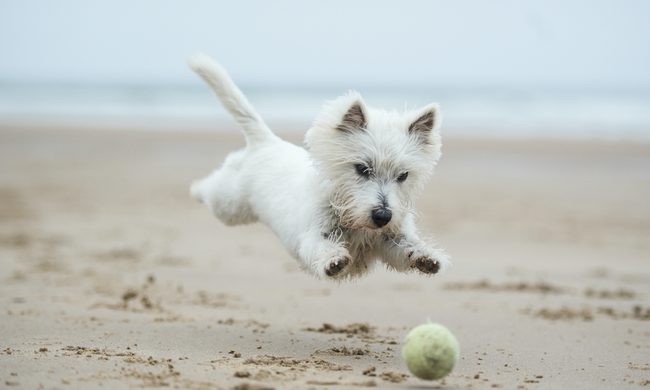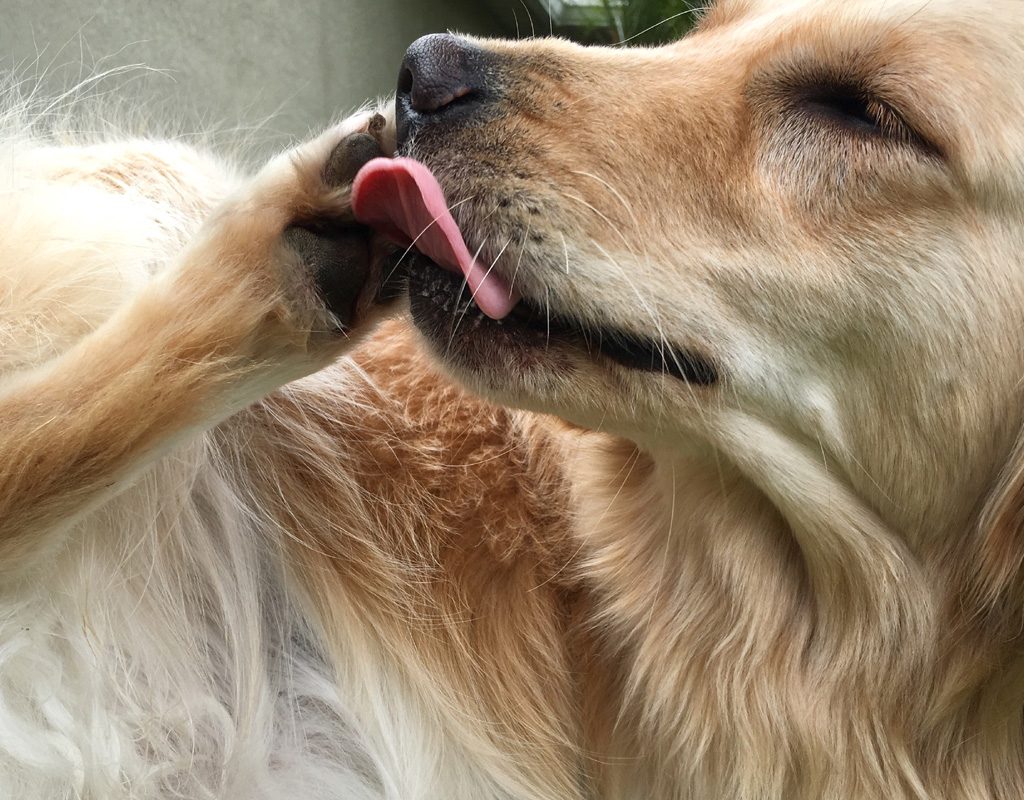
If you’ve noticed your dog biting their paws, you’re certainly not alone. Many pet parents have taken to Google to search “dog biting paws,” but it can take a lot of research and observation to get a clear-cut answer. In the end, there are many reasons a dog may lick or bite at their paws, and you’ll need to pay closer attention to your pup to see what may be going on. This may include physically examining their paws, including the toenails and between the paw pads. If that doesn’t do the trick, a veterinarian’s exam might be necessary to get to the root of the problem.
But before you dial the phone, read up on these reasons for paw biting to see if anything matches up with what your dog is experiencing.
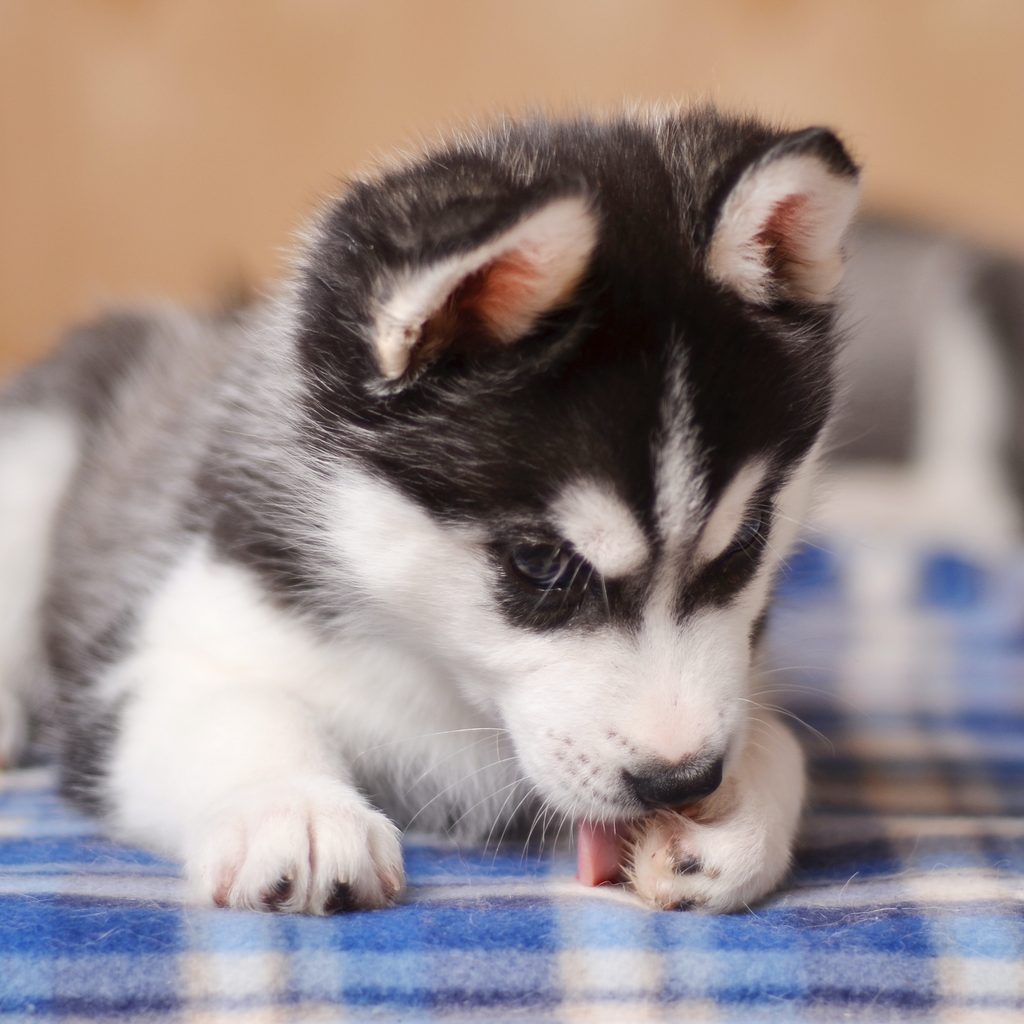
Dogs bite their paws when feeling itchy for a variety of reasons
Oftentimes, a dog that’s biting their paws is experiencing an itch. While they can’t verbalize what’s going on or what it feels like, there are a few things to look out for when examining your pup’s feet.
Allergies
Allergies can be tough to spot in dogs because they manifest in a number of ways. You can’t always see a dog’s allergy if the skin itself isn’t irritated, but you can still keep an eye out for wet spots where your pup has been licking, biting, or chewing. The most common allergies that cause paw licking and biting are food allergies and environmental allergies, notes Teresa Manucy, DVM, with PetMD, so make an appointment with your vet if you think this may be the case.
Dandruff or dry skin
If you examine your dog’s paws and notice any flakes or dandruff, you can conclude that they’re dealing with dry skin. This is more common in the winter and can be remedied fairly easily. That’s right — even dogs need to be moisturized sometimes!
Hot spots
Dogs can develop hot spots — or spots of irritation on the skin — if they’ve been licking their paws excessively. Since this is technically a complication of licking and biting rather than a cause, it’s likely not the root of your pup’s problem.
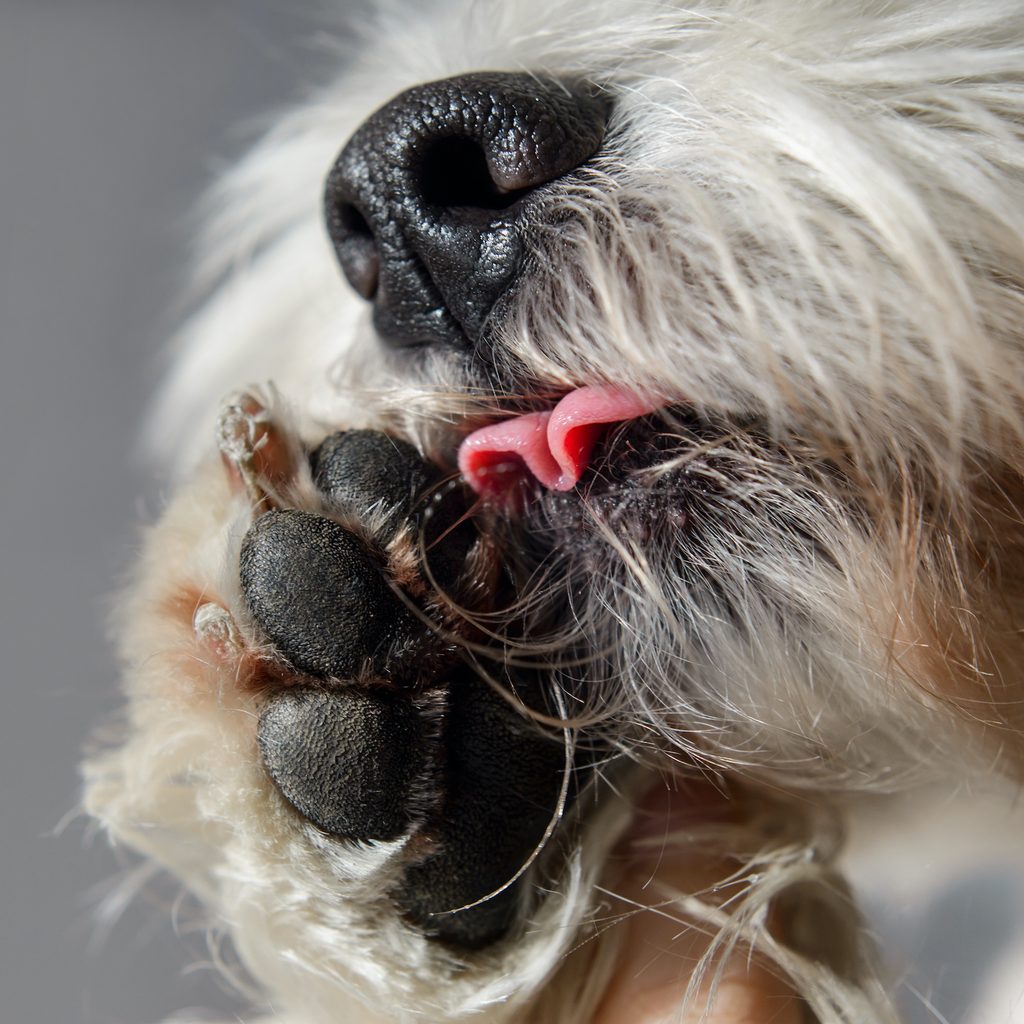
Your dog might be fighting an infection in the paw
Sometimes, a chronically itchy paw can be a sign of an infection in the paw. Luckily, you should be able to notice something amiss when you look at your dog’s paws. As Dr. Manucy mentions, the presence of scabs, redness, flaky skin, and hair loss could indicate a bacterial or fungal infection. Rarely, though, a dog can show no symptoms aside from itchiness.
Yeast is naturally present in paws — this is what causes that “Frito” or “corn chip” smell that dog owners have a love-hate relationship with — but it can sometimes overgrow into a yeast infection. If this is the case, you’ll notice a greasy feel to their skin and some irritated, red areas on the paw pads.
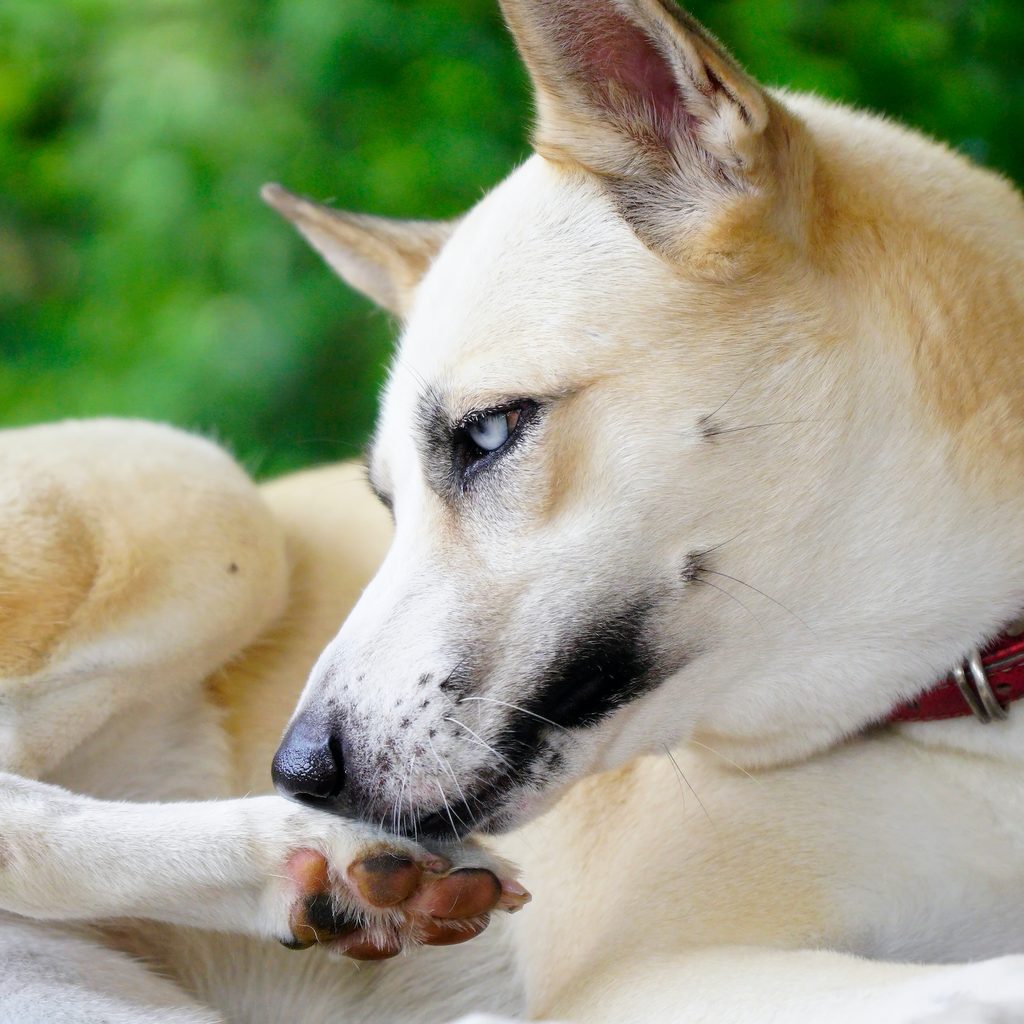
Dogs may bite their paws if there’s discomfort or injury
As any creature would, many dogs will tend to a wound or favor a paw if it’s feeling sore. Some injuries are obvious and easy to spot, but other, smaller concerns may take a lot longer to notice. That’s why it’s always worth checking if your dog might have a splinter, foxtail, or other foreign object stuck in their paw.
Overgrown toenails
Toenails are another cause of discomfort that owners may not think of. In the same way that ingrown or overgrown nails cause pain for people, they can cause major pain for dogs! This is why it’s so important to keep up with your dog’s nail trimming, even if that means taking them to a groomer or the vet.
Irritation from environmental factors
Sometimes, a dog may experience temporary paw discomfort because of something they encounter in their environment. Whether it’s hot pavement (ouch!), freezing ice, or a chemical like the salts used to melt snow, you’ll definitely notice some redness or irritation on the paws. Cold weather is especially hard on dog’s paws. This is why it’s so important to be mindful of the surfaces you’re walking on, no matter what time of year it is.
Ticks, mites, and insect bites
Alternatively, you may notice a bump that looks an awful lot like an insect bite. It happens. Most bites aren’t cause for concern, but be sure to remove any ticks as soon as you find them. You may have to feel between the paw pads to find any pests that have hitched a ride, so make sure to do a thorough search.
Mites, however, don’t look like insects! An infection of mites will look more like a rash, with redness, flakiness, hair loss, and even bacterial infections. You may need a vet visit to diagnose vague symptoms, but one visit will have your dog feeling better soon.
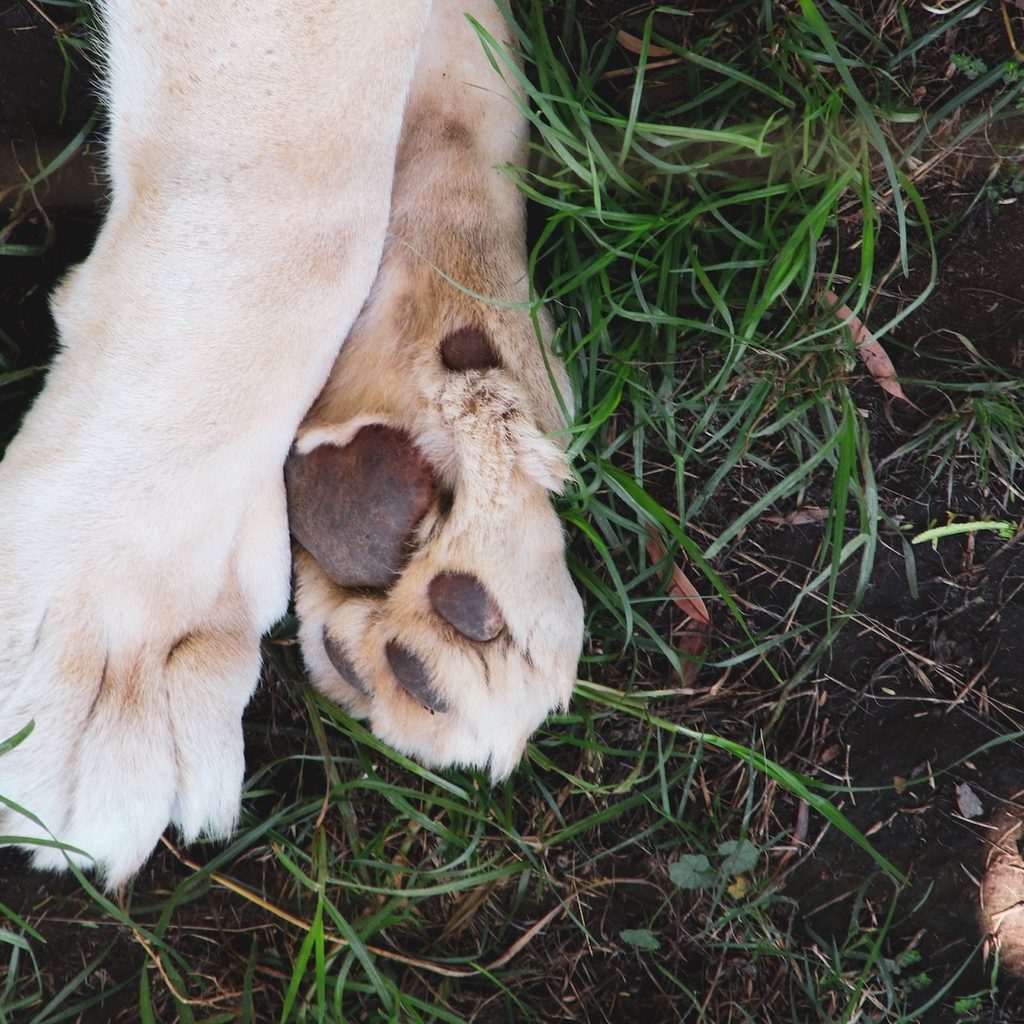
Some dogs lick their paws – even excessively – out of boredom or anxiety
Sometimes, you might find nothing at all while examining your dog’s paws. While an itch isn’t out of the question just because there’s no redness or irritation, you’ll want to keep an eye on your pup to determine whether they’re biting their paws out of boredom or anxiety. This may be the case if they’re licking and biting at their feet at times when they haven’t recently been exposed to irritants: food, grass, etc. If it’s unclear, keep track of your pup’s schedule, including when they bite their paws. At the least, it will help your dog’s veterinarian determine a pattern — and potential cause — in the behavior.
It can be tricky to determine why your dog is biting their paws, but you’ll be glad to know that virtually every cause of paw discomfort can be remedied. Don’t forget that your veterinarian is there to help when things are unclear, but we hope you’ve learned a lot about dog paw biting and why it occurs.




